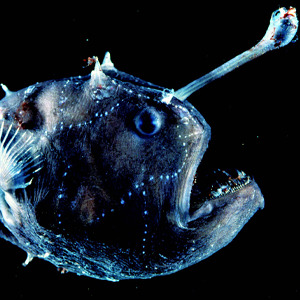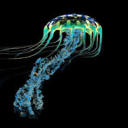Threadfin Snailfish

Threadfin Snailfish
Careproctus longifilis
The Threadfin Snailfish resembles a prehistoric tadpole that is ghostly white. The holes in its face are large sensory pores that help them detect changes in the ocean. It is often found at depths between 1900 to 2997 meters.
Photo credit: https://www.timeout.com/singapore/museums/creatures-of-the-deep
More Posts from Bioluminescentoceangoddess and Others



Black Dragonfish
Idiacanthus atlanticus
The Black Dragonfish are needle-like fish that migrate between 500m and 2000m in the deep ocean. Females are black with 6 stripes and lack a barbel, pelvic fins, and sharp teeth. Males, on the other hand, are dark brown and have a barbel, which is the light producing structure on its chin. Furthermore, it uses bioluminescence to detect prey instead of lure prey.
Photo credit: https://scitechdaily.com/scientists-learn-secrets-from-ultra-black-skin-that-allows-deep-sea-fish-to-lurk-unseen/
https://steemit.com/life/@munnashah/the-most-terrible-and-surprising-7-animals-of-the-sea
https://knowyourmeme.com/photos/995601-thalassophobia


Cigar Comb Jelly
beroe forskalii
The Cigar Comb Jelly is a gelatinous ctenophore that is marveled by many due to its sparkling bioluminescence. It tends to elegantly float around 120 m in the ocean. It uses unique, hair-like structures called ctens to move horizontally in the ocean. It also swims in a spiral pattern before consuming zooplankton in the ocean.
Photo credit: https://www.wrobelphoto.com/gelatinouszooplankton/h25347306
https://www.flickr.com/photos/a_migotto/27227530815

Scaly Dragonfish
Stomias Boa
The Scaly Dragonfish is about 32cm long and found at depths between 200 to 1500m. The long purple barbel on its chin is used to lure in prey. When the pery gets close enough, it swings its jaws forward swallowing the prey whole.
Photo credit: https://alchetron.com/Stomias
Video on the fish: https://www.youtube.com/watch?time_continue=69&v=9oB_61aI2iQ&feature=emb_title

Black Medusa
Vampyrocrossota childressi
The Black Medusa is an inky, black hydrozoan that absorbs all light that hits its tiny body. It has a translucent gelatin and a black umbrella; it is also only 1.5 cm in size. Moreover, it is found at depths between 600m to 1500m, and it spends its entire life floating in the deep ocean.
Photo credit: https://www.pinterest.com/pin/488148047080475827/
Pyrocystis fusiformis is a common plankton that produces bioluminescence. Not exactly a marine animal, but an amazing organism that produces bioluminescence. So, I thought it was worth sharing on this page.



Pyrocystis fusiformis
Pyrocystis Fusiformis is a marine dinoflagellate that is non-motile and has a short life cycle (5-7 days). When disturbed, the dinoflagellate displays vibrant, blue bioluminescence. The bioluminescence is design to startle grazers, or cause them to glow, making them more vulnerable to predators. During the day, it uses photosynthesis to produce its own food, and it produce bioluminescence at night. Furthermore, it fixes carbon from the ocean and produces oxygen for the marine animals that live there. All in all, I find this diamond shaped plankton to be unique and beautiful.
Photo credit: https://fineartamerica.com/featured/2-bioluminescence-of-pyrocystis-fusiformis-gerd-guentherscience-photo-library.html
https://exploringtheinvisible.com/2013/11/21/c-mould-new-acquisition-pyrocystis-fusiformis/
https://www.flickr.com/photos/13084997@N03/32823053106

Vampire Squid
Vampyroteuthis infernalis
Even though the Vampire Squid is named after a notorious monster, this gentle creature does not live up to its name. It is only a foot long and occupies depths between 650m to 1500m in the deep ocean. Unlike other squids, it has reduced musculature and collects particles in the water column. However, it is capable of huge bursts of speeds. It uses bioluminescence to confuse both predators.
Photo credit: https://ocean.si.edu/ocean-life/invertebrates/vampire-squid-hell


Football Fish
Himantolophus paucifilosus
The Football fish is a deep sea angular fish located between 1000 to 4000 meters in the ocean. The glowing dots on its body are sensory organs called neuromast that help the fish detect changes in the water.
Photo credit: https://alchetron.com/Footballfish
https://www.amazon.com/Creatures-Deep-Search-Monsters-World/dp/1770852816



Fangtooth
Anoplogaster cornuta
The Fangtooth is a ferocious predator that is found at depths between 600 m to 5000 m. It has large, needle like teeth that are used to catch prey. It also has extremely sensitive sensory canals underneath of its scales used to detect movement in the water. Furthermore, their preferred prey are crustaceans and fish.
Photo credit: https://pixels.com/featured/fangtooth-fish-dant-fenolio.html
https://www.pinterest.com/pin/845902742487789950/
https://www.newscientist.com/article/mg23231020-400-up-close-with-the-giant-teeth-of-the-deepsea-fangtooth/


Black-devil anglerfish
Melanoncetus johnsoni
The Black-devil anglerfish is a skilled predator that lurks in the darkness. It uses a bioluminescent organ, a top its head, to lure unsuspecting prey into its jaws. Even though these fish are terrifying to look at, they are about the size of a grape fruit. To save energy, they remain immobile in the water, yet they can detect even the slightest vibrations. Since finding a mate is hard at this depth, male fish will attach themselves to a female and slowly dissolve into her tissue; so she is able to use the sperm the male provides at any time. In addition, this is the fish that tried to eat Marlin and Dory in “Finding Nemo.”
Photo credit: https://underthevastblueseas.tumblr.com/post/40882487364/this-female-black-devil-anglerfish-with-her-flabby
https://www.pinterest.fr/pin/574631233709001328/

Black- eyed squid
Gonatus onyx
The Black-eyed Squid is roughly over one foot (35 am) and is found at depths as deep as 2500m. The female Black-eyed Squid works fiercely to protect her babies, by carrying around a patch of egg for six to nine months. When the eggs hatch, 2000 to 3000 babies are released into the ocean. However, this makes her vulnerable to predators.
Photocredit: http://tolweb.org/Gonatus+onyx/19769
-
 eclectichellmouth reblogged this · 1 month ago
eclectichellmouth reblogged this · 1 month ago -
 stardustandmoonflowers liked this · 1 year ago
stardustandmoonflowers liked this · 1 year ago -
 lemon-lime-lauren reblogged this · 1 year ago
lemon-lime-lauren reblogged this · 1 year ago -
 dragoonmagic liked this · 1 year ago
dragoonmagic liked this · 1 year ago -
 thevoiceofmadness liked this · 2 years ago
thevoiceofmadness liked this · 2 years ago -
 moondazie liked this · 2 years ago
moondazie liked this · 2 years ago -
 dragon-teapot reblogged this · 2 years ago
dragon-teapot reblogged this · 2 years ago -
 saltmatchescandlewax reblogged this · 2 years ago
saltmatchescandlewax reblogged this · 2 years ago -
 unknowinglysenescent liked this · 2 years ago
unknowinglysenescent liked this · 2 years ago -
 stopsixcrucifix reblogged this · 2 years ago
stopsixcrucifix reblogged this · 2 years ago -
 lifejoose reblogged this · 2 years ago
lifejoose reblogged this · 2 years ago -
 adventures-of-indiana-croft reblogged this · 2 years ago
adventures-of-indiana-croft reblogged this · 2 years ago -
 shortsweet2thepointe liked this · 2 years ago
shortsweet2thepointe liked this · 2 years ago -
 weirdestwebizen liked this · 2 years ago
weirdestwebizen liked this · 2 years ago -
 m-erminea reblogged this · 2 years ago
m-erminea reblogged this · 2 years ago -
 m-erminea liked this · 2 years ago
m-erminea liked this · 2 years ago -
 gayassholeposts liked this · 2 years ago
gayassholeposts liked this · 2 years ago -
 soft-fuzzy-communist liked this · 2 years ago
soft-fuzzy-communist liked this · 2 years ago -
 hmmmmho liked this · 3 years ago
hmmmmho liked this · 3 years ago -
 low-level--00 reblogged this · 3 years ago
low-level--00 reblogged this · 3 years ago -
 low-level--00 liked this · 3 years ago
low-level--00 liked this · 3 years ago -
 oogaboogaghosttt liked this · 3 years ago
oogaboogaghosttt liked this · 3 years ago -
 autokrates reblogged this · 3 years ago
autokrates reblogged this · 3 years ago -
 mistytower liked this · 3 years ago
mistytower liked this · 3 years ago -
 funkypeach77 liked this · 3 years ago
funkypeach77 liked this · 3 years ago -
 psionic--drain liked this · 3 years ago
psionic--drain liked this · 3 years ago -
 bluurei liked this · 3 years ago
bluurei liked this · 3 years ago -
 1eldiablo6 liked this · 3 years ago
1eldiablo6 liked this · 3 years ago -
 the-old-gay-goose reblogged this · 3 years ago
the-old-gay-goose reblogged this · 3 years ago -
 dippindotssz liked this · 3 years ago
dippindotssz liked this · 3 years ago -
 jerrielzapata liked this · 3 years ago
jerrielzapata liked this · 3 years ago -
 linkinzizs-blog liked this · 3 years ago
linkinzizs-blog liked this · 3 years ago -
 sewer-dweller liked this · 3 years ago
sewer-dweller liked this · 3 years ago -
 shylittlemoosen liked this · 3 years ago
shylittlemoosen liked this · 3 years ago -
 astrotracksuitbattalion liked this · 3 years ago
astrotracksuitbattalion liked this · 3 years ago -
 aimeeisnotcrazy liked this · 3 years ago
aimeeisnotcrazy liked this · 3 years ago -
 calamitycrash liked this · 3 years ago
calamitycrash liked this · 3 years ago -
 gothfrog-44 liked this · 3 years ago
gothfrog-44 liked this · 3 years ago -
 la-vie-en-lys reblogged this · 3 years ago
la-vie-en-lys reblogged this · 3 years ago -
 la-vie-en-lys liked this · 3 years ago
la-vie-en-lys liked this · 3 years ago -
 throw-away-dot-org liked this · 3 years ago
throw-away-dot-org liked this · 3 years ago -
 sinideasnome liked this · 3 years ago
sinideasnome liked this · 3 years ago -
 trucko1000 liked this · 3 years ago
trucko1000 liked this · 3 years ago -
 tigirl-and-co reblogged this · 3 years ago
tigirl-and-co reblogged this · 3 years ago -
 tigirl-and-co liked this · 3 years ago
tigirl-and-co liked this · 3 years ago -
 ghost-in-a-wasteland liked this · 3 years ago
ghost-in-a-wasteland liked this · 3 years ago -
 windyboysworld liked this · 3 years ago
windyboysworld liked this · 3 years ago

Bioluminescence is a chemical reaction that produces light. Many deep sea animals use bioluminescence. This blog is dedicated to educating the public about the amazing creatures that thrive in the deep sea.
57 posts